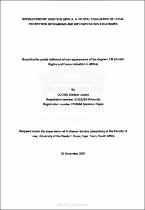| dc.description.abstract | There is an emerging broad consensus that civil and political rights on the one hand, and
socio-economic rights on the other, are ingenerated and indivisible. Taken together, they
embody the cardinal norms which inform modem human rights systems as expressed
through the lntemational Bill of Rights as well as other innovative human rights
instruments. ln spite of this agreement about the normative structure and relationship
between the two categories of lights, it is common knowledge that within the province of
intonational relations, the focus of African states and, to some considerable extent,
transnational entities, has predominantly been on civil and political rights. So too have
the monitoring activities of most African human rights non-govemmental organisations
been confined to this same set of rights. Although a few African human rights groups are
seeking to change this approach, the overall trend remains significantly unaltered. The
fall-out of the above phenomenon is the devaluation of socio-economic rights in Africa.
This study attempts to analyse the crisis of implementing socio-economic rights
standards in Africa, flowing from the attitudinal patterns of states as well as non-state
actors in downgrading the obligations of states in this regard. Applying a generalised but
qualitative sampling strategy across Africa, this study examines the impact of
intonational and regional socio-economic rights instruments at domestic levels. A
central concern is demonstrated in this study for the role of the civil society in evolving
pragmatic strategies, within the applicable legal framework, to hold African states
accountable to the people for the performance of their obligations. The study also
explores the possibility of galvanising intonational, regional and domestic human rights
instruments towards the attainment of an enhanced regime of socio-economic rights in
Africa, and the ultimate improvement of the qualig of the lives of the most vulnerable
people all over Africa. Extrapolating from the dynamic interplay of legal protection
mechanisms and implementation strategies, as we!! as the problematics involved
therein, this study proffers viable trajectories for concerted activism at the levels of the
civil society in Africa. | en_US |

